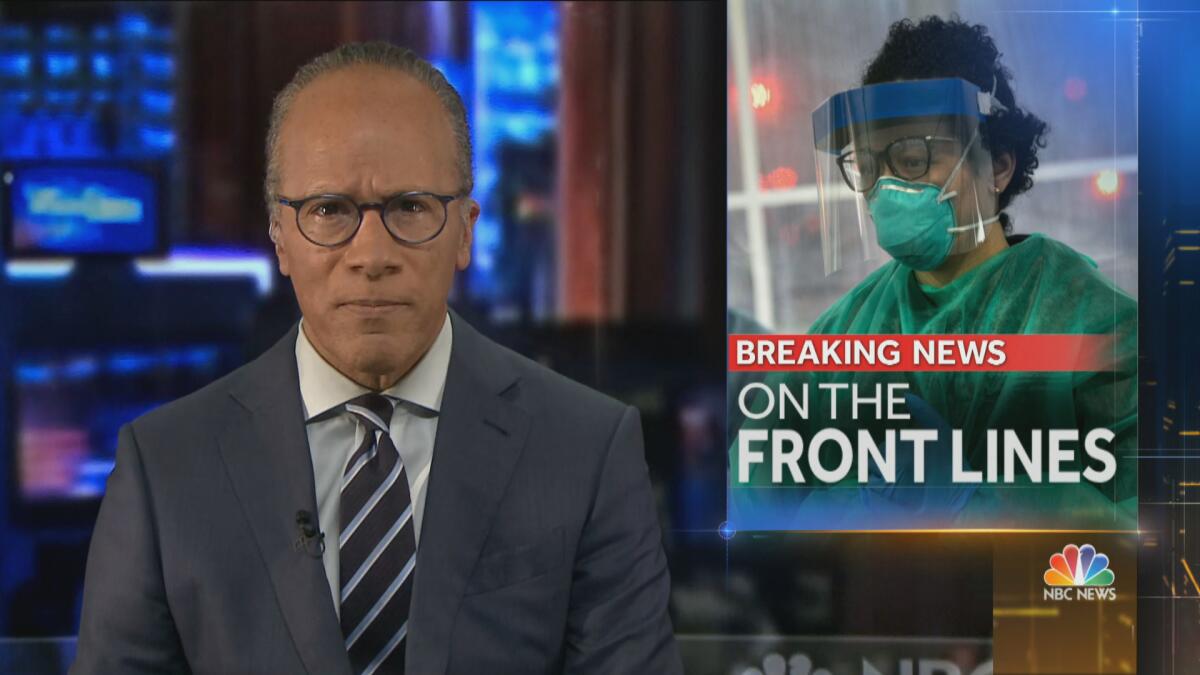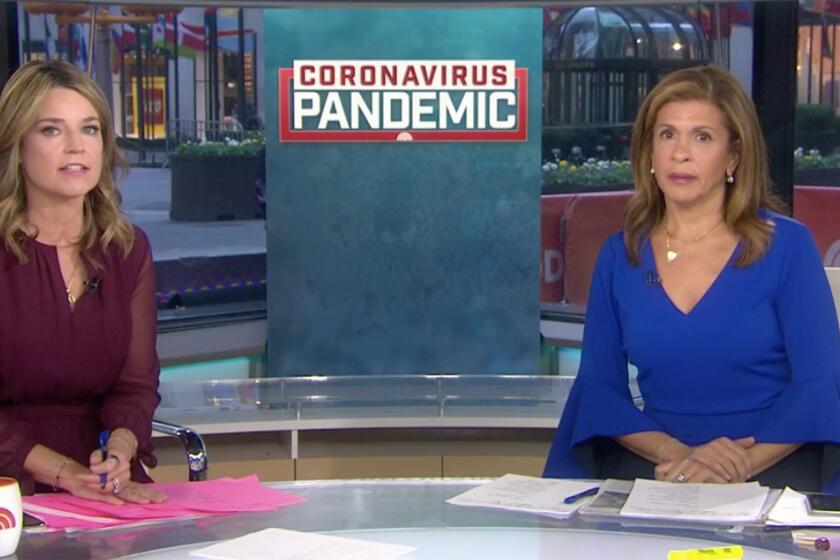‘It hits you.’ Lester Holt on anchoring the evening news amid coronavirus crisis

- Share via
The network evening news has seen a resurgence during the coronavirus pandemic with an average of 30 million people watching the nightly half-hour telecasts on ABC, CBS and NBC in recent weeks.
Around 10 million of them have been turning to Lester Holt, anchor of the “NBC Nightly News,” who is among the many TV news personalities working from home to protect them from the pandemic.
Guests and anchors practice social distancing as more staffers test positive.
On Tuesday at 10 p.m. Eastern, Holt will do a second shift with a live hour-long program across NBC, MSNBC and the streaming service NBC News Now, where viewers can submit questions via Facebook and Instagram to the network’s team of experts, doctors and correspondents.
Holt, 61, spoke with the Times from his home in downtown Manhattan about how his job has changed with the massive story.
You have been immersed in major ongoing stories before, such as the second Gulf War, when you were on the air continuously for hours on MSNBC. How is the experience of covering the coronavirus different?
I mean, there’s no story bigger — I think we can all agree on that. But throughout my career when the big, all-hands-on-deck story happened, we were working as a team face-to-face in the trenches, either in the field or in the studio. And there was this machinery that was around you. And in many ways it sustained you.
Here we are covering a story bigger than anything any of us have covered before, and that machinery is still whirling, except we don’t see each other.
Have you adjusted to doing the broadcast from your home each night?
It’s strange. The engineers came in and transformed one of my rooms into a TV studio. I still can’t believe it. I now have a certain number of technical functions that I have to perform every evening to get ready for the broadcast. After 40 years in this business, I’ve certainly picked up a few things here and there by watching the pros do it. The voices in my ear are the same voices I hear when I’m in the studio. And so it’s amazing how adaptable all of us are.
Two weeks in, now it’s kind of my norm. And it still looks like our broadcast, I’m still the anchor of the broadcast. It’s not lost on me that people are looking for touchstones in their life right now, things that feel, you know, normal, or regular, or part of their life. And to the extent that having “Nightly News” on the air every night helps sustain that, then, you know, that’s wonderful.
People can learn about the coronavirus all day on cable news, but more people are coming to the evening news than they had in the period before the story. Does it feel like the audience has sort of rediscovered the value of these broadcasts that have been around for decades?
I’ve never been one of those who thought the sky was falling in terms of the evening broadcast. I mean, we still deliver, you know, huge audiences every night. But the fact is, people are home right now. A lot of the people that would be watching us are simply on the road, you know, at 5:30 or 6:30, whatever time they have to watch nightly news in their market.
We’re all being bombarded now with a ton of information — what we’re seeing on the news, what we’re reading, friends on Facebook or other social media. And I think there is a craving to have a one-stop-shopping experience where you know you’re going to get the very latest, you’re going to get factual information from people that you’ve watched perhaps for decades, that you trust.
How are you just adapting to this new day-to-day life as a stay-at-home anchor? What do you do to stay healthy?
Well, I work out every day normally in the gym in my condominium. That’s closed right now. But I have a mat and I have some light weights. I generally do a lot of body-weight exercises, kind of high-intensity stuff. Being home has been delightful. My wife makes me lunch every day, which is pretty awesome because normally I’m kind of cruising through the NBC commissary, if I have lunch at all. So I’m actually eating quite well. Thank you for asking.
Being at home took a couple days of adjustment to try and figure out the workflow of how I go about my day. I don’t have people coming in my office all day so I find I have a little more free time, strangely enough. But it’s a business where we’re constantly in touch with phones going off all the time.
Where does the family dog go during the program?
That’s where my technical manager/wife comes in. So she walks the dog usually before the broadcast, and then they sit in the living room, which is a few rooms away from where I broadcast. But we’ve both kind of resigned ourselves with the fact that at some point there’s going to be a doorbell, there’s going to be a barking dog, and I’ll just deal with it when it comes. But we’re doing our best to keep her quiet.
Your son Stefan is an anchor on NBC’s New York TV station WNBC. Are you trading any notes with him about the experience of covering the pandemic?
We’re talking, mostly as father and son, as all families right now are staying super-close. But we’ve talked about the story, and like everyone else, we have these moments where we ask, “How is our world changing? How will it evolve?”
The truth of the matter is the material that we’re reporting every night is difficult, and there have been some nights where I’m actually reading the story, or watching our correspondent reports, and it hits you — it rocks you. I mean, to sit there and look at the monitor in front of me and see refrigerator trucks on the streets of New York, temporary morgues, one part of your mind says, “No, no, that’s happening someplace far from here.”
Because those are the kind of things that we generally see through a lens of thousands of miles away on another continent. It’s really, really hard. I encourage all my staff and everyone, take five minutes, take 10 minutes. Walk away. If you can get outside for a few minutes safely, do so.
Are you thinking about what the tone of the broadcast will be if the death toll continues to rise and the story becomes even more grim? Is there a point where you don’t have music, graphics or commercials?
It’s something that I had brought up in casual conversation. It’s more of, “Is this format going to work under certain circumstances?” I haven’t made any decisions, but I think there’s a recognition that in some way, we’re going to have to confront the reality around this, and how we react. I think we’re just going to have to continue to be responsive and really kind of understand what’s happening, and how it’s happening, and what our roles are. Because we know that people are depending on us in ways that we haven’t seen probably since I would say 9/11, or perhaps, you know, Katrina, or some of the bigger natural disasters.
Is the familiarity with you as someone who has been in the anchor chair every night for the last five years a comfort to audiences?
Yeah. As I said, I think people right now crave things that feel normal. Because so much is not normal now. So, you know, when something comes on the TV or something happens it’s, like, “Yeah, that’s regular. OK, I can deal with that.” And I think that our broadcast is — has been appointment television for decades for a lot of people. And I’m glad I’m there for the appointment every night.
More to Read
Inside the business of entertainment
The Wide Shot brings you news, analysis and insights on everything from streaming wars to production — and what it all means for the future.
You may occasionally receive promotional content from the Los Angeles Times.












